8 Things All Mindful Investors Should Read
Like everything, running your financial life falls somewhere between art and science. Blend a bit of skill and knowledge with a dash of faith, a dollop of luck, and a dose of experience. Add to that your own unique values, and voilá: your personal financial philosophy begins to take shape. And the more informed you are, the better you can gauge whether a strategy or approach makes sense for you.
Our list of top resources for mindful investors runs the gamut from economics basics to value-investing extra credit. Peruse any of them, and we think you’ll learn a little bit. Read all of them, and you’re on par with us for financial nerdery. (That’s a compliment.) ;)
Brush up on your economics basics
#1: How the Economic Machine Works in 30 Minutes, Ray Dalio
In this animated video, Ray Dalio leaves you with three wise, simple and practical take-aways to inform your own money management. He explains fundamental economic principles and shows how the relationship between spending, income, debt and productivity fuels a cycle of growth and recession. It’s 30 minutes well-spent.
What you’ll learn: In a nutshell, the economy is driven by predictable forces, and human nature. This video introduces you to the relationship between these forces, and helps explain why we have macroeconomic cycles of expansion and contraction.
Why you should listen to Dalio: He’s founder of the world’s largest hedge fund firm Bridgewater Associates, and is on multiple “richest-people-in-the-world” lists, among other things.
Investment how-tos from the rich and famous
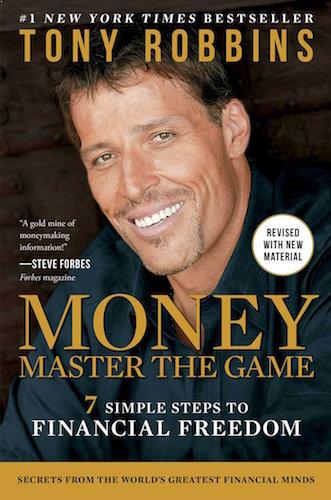
#2: Money: Master the Game, Tony Robbins
Seven chapters between you and a blueprint to attaining financial freedom. Robbins’ well-researched, accessible storytelling dispels the mystery and myth that surrounds financial planning, and is designed to help investors of all incomes and backgrounds get their financial house in order. He’s an engaging writer and speaker, and has a knack for explaining complex concepts in language we can all understand.
What you’ll learn: Robbins walks readers through the rules of the game of money, showing you how to master it. You’ll come away with a template for a lifetime financial plan based on the success of the .001 percent.
Why you should listen to Robbins: Don’t let the cheesy life-coach-self-help vibe turn you off. Robbins is recognized as an outstanding strategist and leader by Accenture, Harvard Business Press and Fortune Magazine. His audio, video and life training programs have been used by fifty million people. Oprah Winfrey calls him “super-human.” Diane Sawyer says he’s a “6’7” phenomenon.” The endorsements at the beginning of this book pretty much say it all.
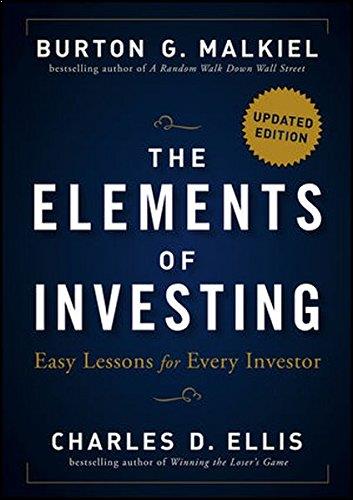
#3: The Elements of Investing: Easy Lessons for Every Investor, Burton G. Malkiel and Charles D. Ellis
Written by two famous financial thinkers, this text is a practical guide for all investors. Malkiel and Ellis explain their investment principles and share powerful, straightforward advice to help investors focus on the long term, avoid costly mistakes, and maintain a disciplined approach all the way to, and through, retirement.
What you’ll learn: A set of essential investment principles to put yourself on a path to long-term success
Why you should listen to Malkiel and Ellis: Both are widely regarded as legendary figures in the investing world, and their resumes as acclaimed scholars, investment consultants and managers, best-selling authors and high-profile thought leaders are lengthy and impressive.
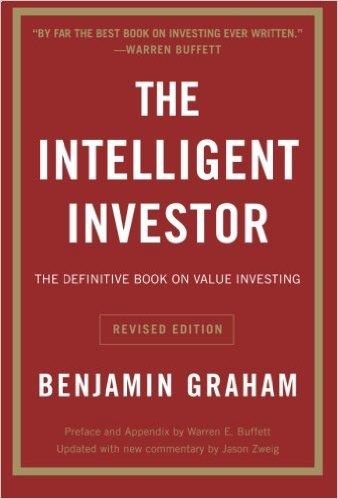
#4: The Intelligent Investor, Benjamin Graham
In 1949, Benjamin Graham penned his now-classic treatise on investing, teaching investors how to avoid mistakes and develop long-term strategies. Generally regarded as the handbook on value investing, the concepts that Graham develops in this book have been proven over time, and remain relevant for mindful investors in today’s markets.
What you’ll learn: From the father of values investing itself, this “stock market bible” preaches the principle of identifying a solid company, purchasing stock when the price is right, and riding out the market fluctuations.
Why you should listen to Benjamin Graham: See above. He’s the father of value investing. Also, he is known as one of the most important investment thinkers in history. Basically, he invented a lot of what we think of as investment common sense today.
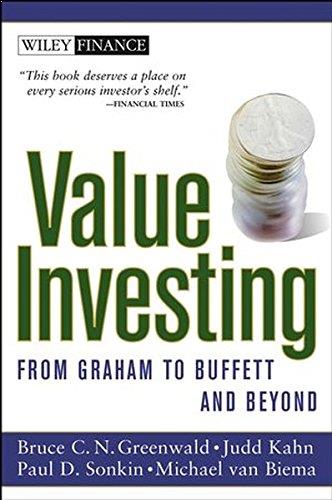
#5: Value Investing: From Graham to Buffett and Beyond, Bruce C.N. Greenwald, Judd Kahn, Paul D. Sonkin and Michael van Biema
Greenwald & Co offer an updated and expanded perspective on value investing in today’s more sophisticated financial markets. This book explains value investing techniques, and profiles several famous value investors to show the strategy in action.
What you’ll learn: How value investing has grown up as the stock market has matured and changed, and how some famously wealthy people have used the philosophy to realize substantial gains
Why you should listen to Greenwald: The New York Times calls him the “guru to Wall Street gurus.” ‘Nuff said.
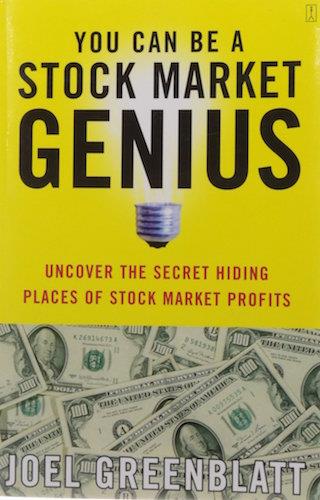
#6: You Can Be a Stock Market Genius, Joel Greenblatt
A straightforward, straight-talkin’ how-to guide to stock market success from a fund manager who has beaten the Dow for more than a decade. Greenblatt’s premise is that the individual investor has a leg up on Wall Street pros because you’re in it for yourself. While the insiders are constrained by factors unrelated to price performance, you can pursue opportunities that they regularly overlook. It’s a fun read, and a great tour of some of the market’s less-frequented opportunities.
What you’ll learn: Greenblatt offers seven basic rules to live by, a tour of the “secret hiding places” of stock market profits for individual investors, and real-life examples of how and why you, too, can be a stock market genius.
Why you should listen to Greenblatt: He’s on a number of investment guru lists, and is author of three acclaimed investment advice books. His company Gotham Capital outperformed the S&P at huge margins for a very long time. In fact, when his batting average declined in 2015, Forbes took it as a sign that a big market correction was a-comin. In other words, in our world, he’s famous.
#7: Warren Buffett’s Letters, by (duh), Warren Buffett
Berkshire Hathaway chairman and famously wealthy investor Warren Buffett is legendary in the investment world. He is also a good writer. His annual letters to Berkshire Hathaway shareholders are entertaining, real-talk reflections. The whole archive is worth reading, but if you’re short on time, Steve Ritter’s Top 5 are a good start.
What you’ll learn: Buffett is known for his quips and shrewd observations. He’s humble, prosaic, and pretty straight with his shareholders about how things went, and what worked or didn’t. You won’t necessarily come away with how-to tips for beating the market, but you will learn about Buffett’s philosophy and approach to investment.
Why you should listen to Buffett (Warren, not Jimmy): Come on, he’s the Oracle of Omaha. If that’s not enough, he’s lucky #13 on Forbes’ Most Powerful People list, the third-richest person in the world, and he got there by his own, practical value-investing self.
Making money mindful
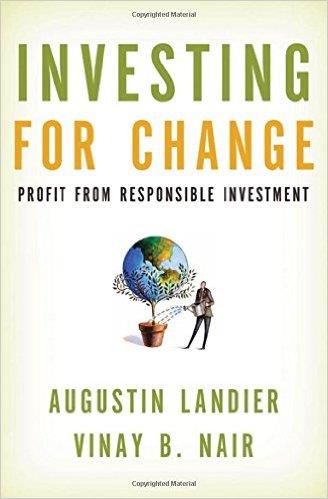
#8: Investing for Change, Augustin Landier and Vinay B. Nair
In this values-investing primer, the authors make the case for socially responsible investing. They draw on research and their own backgrounds in asset management to give a broad overview of SRI and its goals. The book addresses key questions about expressing your values through your investments, the profitability and sustainability of SRI, how to measure companies’ virtues and whether SRI makes a difference in overall corporate behavior.
What you’ll learn: If you’re new to the world of mindful investing, this straightforward overview of responsible investing covers basic concepts and questions about the approach.
Why you should listen to Landier and Nair: Co-founders of hedge fund Ada Investments, Landier is an economist, author and professor at Toulouse School of Business. Nair is a professor and author, and made Institutional Investors third annual list of Hedge Fund Rising Stars in 2012.
Extra Credit
#9: How to Value Stocks, Jae Jun (Old School Value)
For the mathematician in you. Valuation of stocks provides you with a sense of what something is “really” worth, and thus, how to determine the difference between a good buy and a premium price. Jun highlights seven different stock valuation methods, complete with his formulae (customized and tweaked through his experience) and tips on when to use each method.
What you’ll learn: Why valuation matters, and seven proven ways to value stocks, with bibliography to boot
Why you should listen to Jun: He’s a prolific writer and contributor to various investment websites, and has captured the attention of DIY-ers like Mint and the American Association of Individual Investors in recent years.
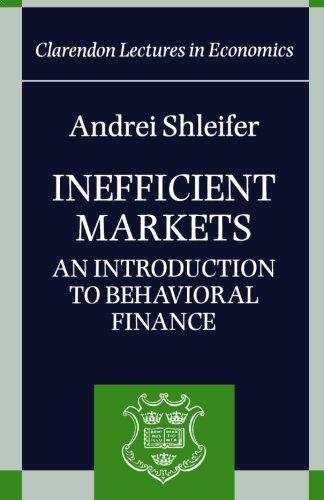
#10: Inefficient Markets: An Introduction to Behavioral Finance, Andrei Shleifer
For the theory lovers out there. Substantial evidence suggests that investor emotions and biases, and arbitrageur limitations actually make real-world markets inefficient. In this introduction to behavioral finance, Shleifer examines the evidence that contradicts the efficient market theory, and presents alternative models for studying financial markets. The book ultimately concludes that behavioral finance models are able to more accurately explain the available financial data than the efficient market hypothesis.
Incidentally, this one makes our list partly because we think it makes sense to acknowledge the human element in economic theory. And also, because an inefficient market is a prerequisite for value investing — you’d never find a good buy if the prices were always a perfect representation of value.
What you’ll learn: Human beings are not rational, and that’s a spoiler for the efficient market hypothesis. Behavioral finance better accounts for our irrational behavior, and provides an an alternative way of predicting or understanding of securities pricing and value.
Why you should listen to Shleifer: He’s an economics professor at Harvard University, a widely published researcher, winner of the John Bates Clark medal and the most cited economist in the world.
#11: Eleven Books Warren Buffett Wants You to Read, curated by Insider Monkey
Extraordinary investor, billionaire, businessman and voracious reader Warren Buffett has peppered his letters, appearances and exchanges with book recommendations over the years. Insider Monkey shares their 11 picks from lists published in Business Insider, The Motley Fool, and Wall Street Journal.
What you’ll learn: The list is all business, and sheds light on the influences that have shaped, evolved and inspired Buffett’s investment philosophy over his impressive career.
Why you should care about Buffett’s book recommendations: The man is a financial-world legend. The definition of investment mogul. A self-made billionaire. And a self-professed lifelong learner. If he thinks it’s a worthwhile use of his time to learn more about these subjects, you might think so too.